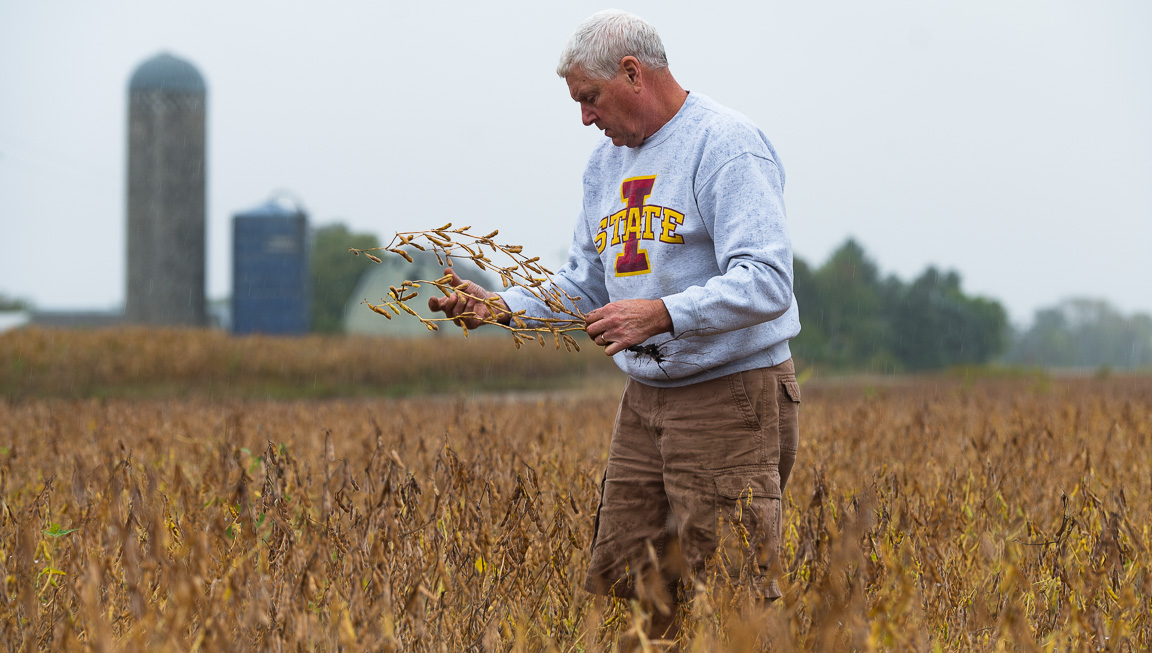
Morey Hill examines the quality of a soybean plant at his rural Madrid farm. Hill participated in virtual meetings with Iowa's Congressional representatives to make sure they are aware of important issues impacting Iowa soybean farmers. (Photo: Joseph L. Murphy/Iowa Soybean Association)
Iowa farmers encourage pro-ag policies during virtual visits
March 25, 2021 | Bethany Baratta
Iowa soybean farmers serving on the American Soybean Association’s (ASA) Board of Directors called on their elected officials in Washington, D.C., to keep challenges related to agriculture top of mind in 2021 during virtual Capitol Hill visits recently.
Trade and market access
During separate conversations farmer leaders encouraged Senator Ernst, Senator Grassley, Congressman Randy Feenstra, Congresswoman Ashley Hinson and Congresswoman Mariannette Miller-Meeks to monitor and engage on U.S.-China trade and other existing markets to ensure continued market access.
“Over 60% of our soybean crop is exported. Besides holding China’s feet to the fire and making them live up to their agreements, we also want to see other markets grow and open up for our product,” said Morey Hill, who also serves as ISA District 5 director.
Iowa soybean farmers harvested 494 million bushels of soybeans in 2020.
“Iowa farmers are great at growing soybeans,” Hill said. “We need all the markets we can get to sell them.”
Members also advocated for reauthorization of Trade Promotion Authority, U.S. reengagement and reentry into the Comprehensive and Progressive Agreement for Trans-Pacific Partnership (CPTPP) and encouraged efforts to increase demand for soybeans domestically and abroad.
Biodiesel
Soy-based biodiesel is an immediate solution to reducing carbon emissions nationwide, said Dave Walton, ISA Board Treasurer and District 6 director.
“If we would go to a 20% biodiesel blend, that’s the equivalent to taking about 18 million cars off the highways of the U.S.,” Walton said. “Just by making that small change we could have a huge impact on the environment.”
Iowa is a leader in soybean-based biodiesel production, producing nearly 400 million gallons per year. By increasing soybean oil value, biodiesel supports 13% of the price per bushel of soybeans, equating to $1.17 per bushel in 2020. Biodiesel production supports livestock producers and the food supply by reducing the price of soybean meal.
Carbon markets
During separate virtual meetings, ISA members encouraged the elected leaders to support policies and voluntary outcomes-based approaches and incentives that include multiple (carbon and water quality) environmental benefits. One example is the Soil and Water Outcomes Fund.
Past ISA President Wayne Fredericks encouraged the elected officials from Iowa to also consider ways in which those who have been involved with conservation efforts for decades can also participate in any future carbon market.
“We can’t play in this arena, but yet we’re the ones that have been the most beneficial to the climate in the long term,” Fredericks said.
He noted that carbon policies which ultimately expand conservation practices are great for the state but thinks about the implications it might have for farmers like him who plan to one day rent out their farmland. If the farm isn’t able to participate in additional markets because of long-term conservation, that excludes future tenants from benefitting from carbon markets. He fears that could mean a future tenant tilling up ground to “add” a conservation practice to reap the benefits of the program.
“We need to try to find a methodology here that makes sense and keeps that ground in conservation,” Fredericks said.
One option, Fredericks suggested, is to expand the Conservation Stewardship Program (CSP).
Estate tax and stepped-up basis
Rumblings that estate tax and stepped-up basis levels could be used as an offset in the infrastructure bill doesn’t bode well for Iowa’s farms, which are largely owned by families.
Past ISA President Brian Kemp from Sibley stressed the importance of preserving current tax levels as farmers hand off operations to the next generation.
“I’m hearing concerns from my fellow producers,” Kemp said. “It could be the perfect storm if we lose stepped-up basis and capital gains tax rates increase. The two would not be a good outcome for farming and passing along farms.”
To learn more about ASA priorities, go here.
Back